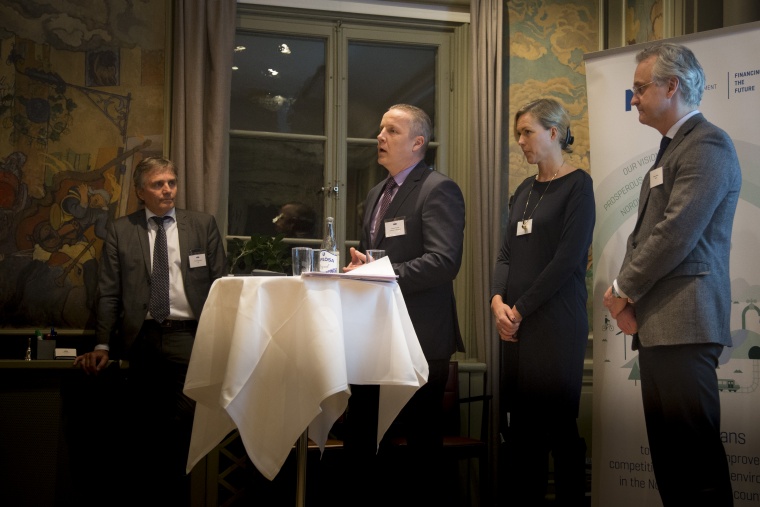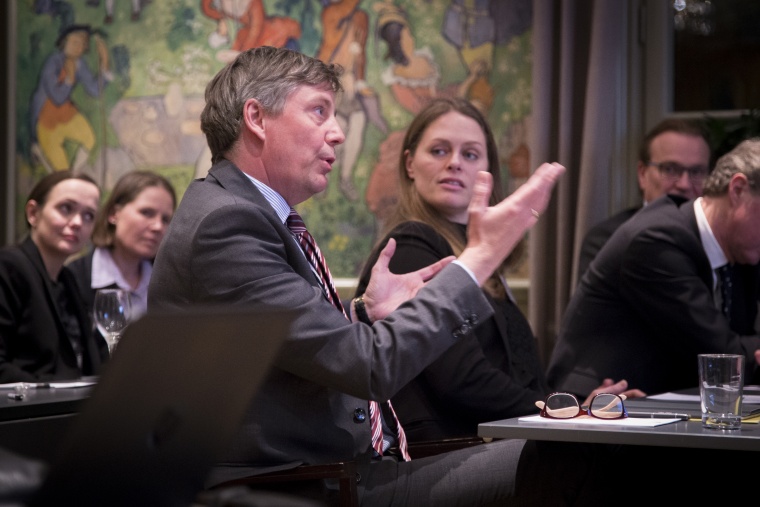NIB seminar discusses solutions for green finance

Meeting the ambitious targets of the Paris Agreement on climate change and the UN’s 2030 Agenda will require trillions of dollars in public and private investment. At NIB’s Green Finance for the Future seminar in Stockholm, the role of a common policy framework and technological innovation for accelerating green finance were discussed.
“The demand for sustainable investment opportunities is growing, especially among the younger generation. People are increasingly aware of how they want their money to be used”, said Magnus Billing, CEO of the Swedish pension fund Alecta, at NIB’s Green Finance for the Future seminar in Stockholm on 31 January 2018.
On the same day, the EU High-Level Expert Group on Sustainable Finance (HLEG), of which Mr Billing is also a member, delivered its strategic recommendations on how to shift Europe’s financial system from post-crisis stabilisation to supporting long-term sustainable development.
“Sustainable finance aims to support economic growth while reducing pressures on the environment and minimising greenhouse gas emissions”, Mr Billing explained. “A common, EU-wide roadmap in this area is needed because financiers require a stable environment that is aligned with long-term targets in order to allocate Europe’s savings with confidence.”
According to the HLEG report, “Think Sustainability First” is the principle that should guide all financial policy-making for Europe over the next decade, so global ambitions can be met.
“In addition to this, technically robust classifications on what is ‘green’ will be essential for mobilising capital at scale and for ensuring transparency. Establishing a European sustainability taxonomy, starting with climate change mitigation, will help to define areas where investments are needed the most.”
Cecilia Repinksi, Executive Director of Stockholm Digital Finance, also sees the creation of an EU-wide roadmap and taxonomy as important steps for steering sustainable finance flows.
“Effective policy frameworks are crucial for accelerating green finance, but investments are still limited”, Ms Repinski argued. “There simply is no Planet B, and creative solutions will be needed to address climate change, energy efficiency and pollution.”
Stockholm Digital Finance is an independent innovation platform tasked with accelerating green finance by promoting fintech innovations, which include blockchain technology, big data, digital currencies, artificial intelligence and smart contracts.

From left: Thomas Wrangdahl, Head of Lending at NIB; Kaspars Āboliņš, Chairman of NIB’s Board of Directors; Cecilia Repinski and Magnus Billing. Photo: Fredrik Sjögren.
“We are looking to test solutions that scale green investments and provide access to financing for smaller actors that are, in many cases, still excluded from the market”, Ms Repinksi explained. “Fintech can help close the investment gap by allowing green start-ups to demonstrate creditworthiness, or to go into business through initial crowdfunding.”
“One example of a green fintech solution is a pay-as-you-go solar energy scheme, which is currently being made available in a number of African countries.”
In December 2017, Stockholm Digital Finance launched the Green Asset Wallet innovation project, a blockchain platform that aims to validate green investments. The project is funded by the Emerging Markets Dialogue on Finance (EMDF) network of the German GIZ.
“The goal is to increase the supply of green debt products by lowering the transaction cost for issuers and to establish trust by verifying the ‘greenness’ of an investment”, Ms Repinski explained.
“Another feature of the platform is its impact reporting function for tracking green projects and showing at what pace their impact is being realised. We are working on converting reported metrics into comparable, shared packages”, she said.
“For this to function as intended, we need a solid framework and a common classification system to build on. This is the basis for building trust and transparency, and for creating a more inclusive market.”

Lars Eibeholm, Head of Treasury at NIB. Photo: Fredrik Sjögren.
The European Commission plans to release a comprehensive EU action plan on sustainable finance, based on the recommendations of the HLEG, in spring 2018.
Read also:
Experts recommend EU develop world’s most sustainable financial system